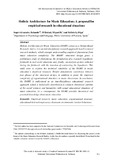Mostrar el registro sencillo del ítem
Holistic architecture for music education: a proposal for empirical research in educational situations
| dc.creator | Ángel Alvarado, Rolando Alfredo | es_ES |
| dc.creator | Wilhelmi, Miguel R. | es_ES |
| dc.creator | Belletich Ruiz, Olga | es_ES |
| dc.date.accessioned | 2019-02-27T13:17:53Z | |
| dc.date.available | 2019-02-27T13:17:53Z | |
| dc.date.issued | 2018 | |
| dc.identifier.uri | https://hdl.handle.net/2454/32426 | |
| dc.description | Trabajo presentado al 4th International Conference on Higher Education Advances (HEAd’18), organizado por la Universitat Politècnica de València, junio de 2018 | es_ES |
| dc.description.abstract | Holistic Architecture for Music Education (HAME) arises as a Design-Based Research, that is, it is an interdisciplinary research approach based on mixed research methods, which attempts understanding empirical phenomena from music education complexity. The HAME’ structural design poses a preliminary study of phenomena, the formulation of a research hypothesis, fieldwork in real-world situations and, finally, an analysis of data collected during the fieldwork with the intention of contrasting the hypothesis. This study aims to explore the technical suitability of the HAME in music education’s empirical research. Results demonstrate consistency between four phases of the structural design, in addition to prove the empirical complexity of organisational structures in music classrooms. In conclusion, the HAME is understood as an interdisciplinary educational research approach, which is holistically described as it connects theoretical currents of the social sciences and humanities with actual educational situations of music education. As a consequence, the HAME provides theoretical and practical knowledge about music education. | en |
| dc.description.sponsorship | The first author has been supported by the National Commission for Scientific and Technological Research from Chile (CONICYT) through a doctoral scholarship [grant number 72160365]. | en |
| dc.format.extent | 7 p. | |
| dc.format.mimetype | application/pdf | en |
| dc.language.iso | eng | en |
| dc.publisher | Universitat Politècnica de València | en |
| dc.rights | This work is licensed under a Creative Commons License CC BY-NC-ND 4.0 | en |
| dc.rights.uri | https://creativecommons.org/licenses/by-nc-nd/4.0/ | |
| dc.subject | Empirical research | en |
| dc.subject | Music education | en |
| dc.subject | Organisational structure | en |
| dc.subject | Educational interaction process | en |
| dc.subject | Classroom environment | en |
| dc.subject | Teacher behaviour | en |
| dc.title | Holistic architecture for music education: a proposal for empirical research in educational situations | en |
| dc.type | info:eu-repo/semantics/conferenceObject | en |
| dc.type | Contribución a congreso / Biltzarrerako ekarpena | es |
| dc.contributor.department | Ciencias Humanas y de la Educación | es_ES |
| dc.contributor.department | Giza eta Hezkuntza Zientziak | eu |
| dc.contributor.department | Estadística, Informática y Matemáticas | es_ES |
| dc.contributor.department | Estatistika, Informatika eta Matematika | eu |
| dc.rights.accessRights | info:eu-repo/semantics/openAccess | en |
| dc.rights.accessRights | Acceso abierto / Sarbide irekia | es |
| dc.identifier.doi | 10.4995/HEAd18.2018.8079 | |
| dc.relation.publisherversion | http://dx.doi.org/10.4995/HEAd18.2018.8079 | |
| dc.type.version | info:eu-repo/semantics/publishedVersion | en |
| dc.type.version | Versión publicada / Argitaratu den bertsioa | es |



